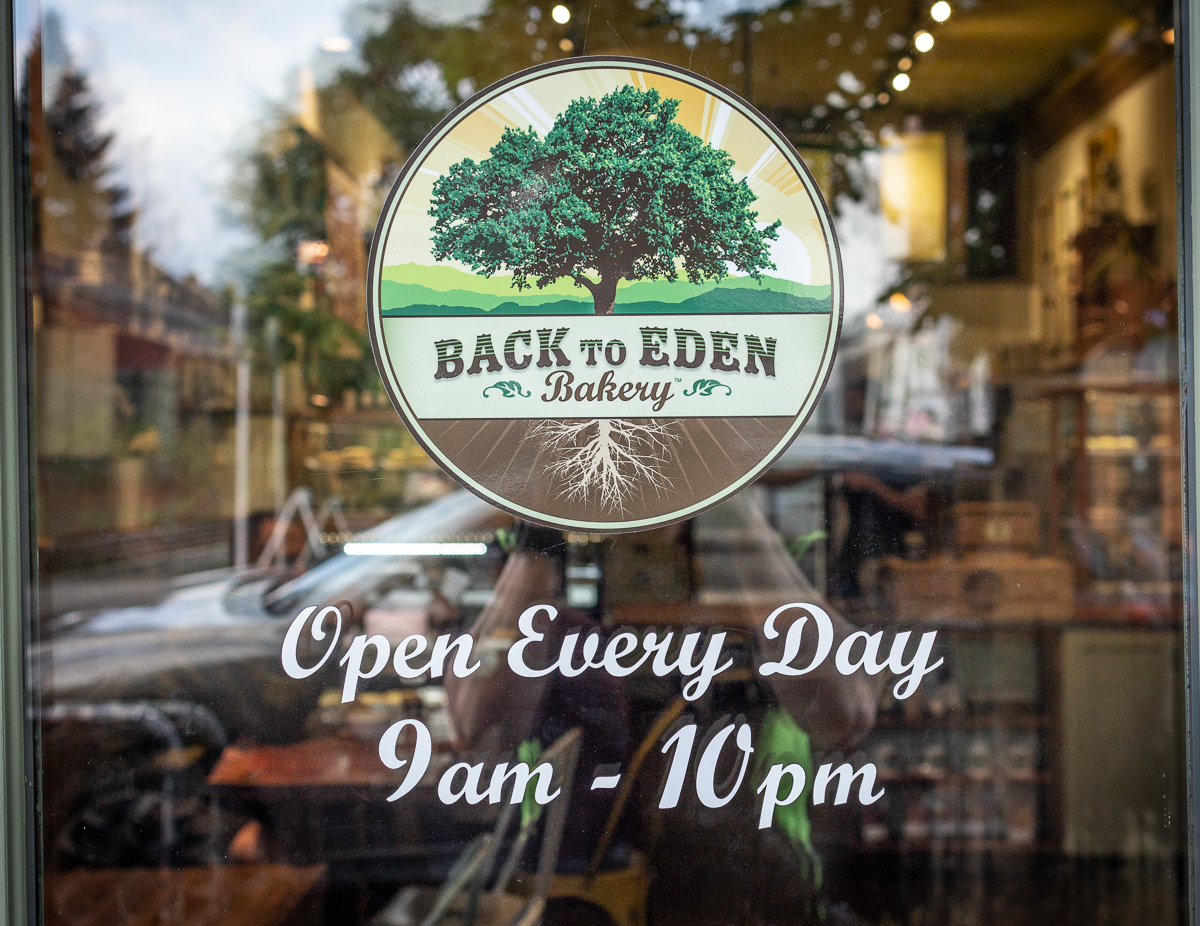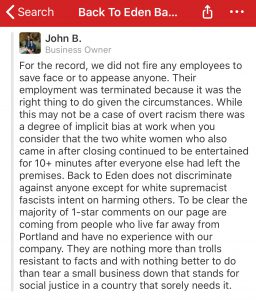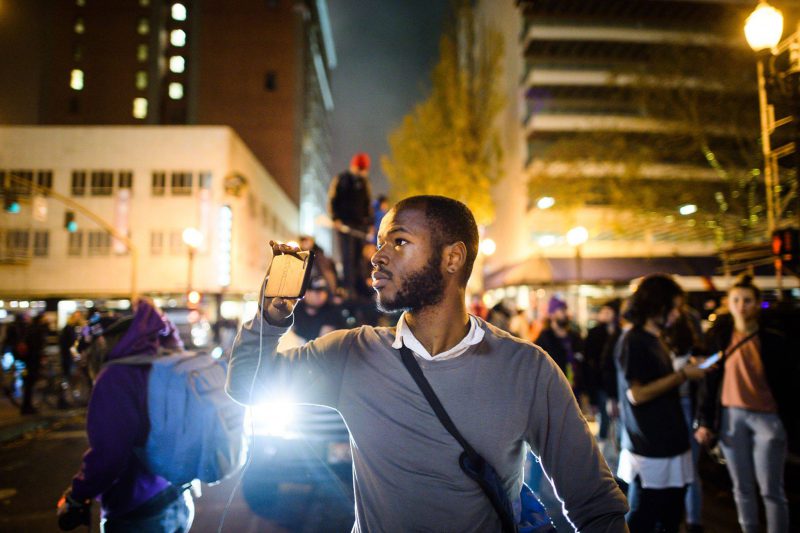Diversity
At this Portland Bakery, White Guilt Poisons the Batter
The panic provoked by accusations of racism led the bakery’s management to issue a series of contradictory and clumsy statements.

The menu at the Back to Eden Bakery in Portland, Ore. features vegan and gluten-free ice cream, cookies and cupcakes, but it might as well itemize its impeccable intersectional credentials. Before hungry customers even set foot in the small shop in north Portland, they are confronted with a battery of progressive signs on a storefront reminiscent of a college equity office. “Safe space,” one of them proudly declares. “Black Lives Matter,” another reminds us. In the name of inclusivity, others carefully list all the different types of identity that are welcome. The bakery is owned by John Blomgren and Garrett Jones, a queer-identified couple. Since their business first opened its doors in 2009 and subsequently expanded, it has unsurprisingly found commercial success among Portland’s (in)famously progressive population.
Last month, however, the business’s overzealous politics cost two young employees their jobs at the Alberta Street location after a local activist released a video complaining that she had been denied service for being black. In the wake of the Starbucks scandal in Philadelphia, in which two black men were arrested after refusing a buy-or-leave request from staff, the bakery owners summarily fired their two female staffers in the hope that doing so would appease the gathering social justice mob. The panic provoked by accusations of racism led the bakery’s management to issue a series of contradictory and clumsy statements. From the shadows, power-hungry community activists readied their arrows.
I first reported this story in late May on my Twitter account, where I documented the statements issued by the bakery and the local activist, even as they were being deleted in real-time.
The bakery has since hired a consulting firm as it struggles to regain control of the narrative. Strategically repositioning themselves as the victims of a “full assault by the alt-right” (a claim for which no evidence has been offered), the bakery is now preparing to deliver its staff into the hands of professional equity educators to retrain them in diversity and inclusion.
So what on earth is going on here? In short, a small network of agit-activists, diversity educators, and sycophantic progressive white allies are trampling over the lives of innocent individuals in pursuit of an equitable power redistribution with them at the top.
Closing Time

Lillian Green says she was a victim of racism at the Back to Eden Bakery in a video shared on social media. Photo: Facebook (screenshot)
At 9:06 p.m. on May 10, Lillian Green, an equity director in the early learning division at the Oregon Department of Education, walked into the Back to Eden Bakery. The dessert shop closed at 9 p.m. and staff had already informed the six remaining customers of the last call to order (the bakery has since changed its closing time to 10 p.m.). The ‘open’ sign had been turned off but the door remained unlocked per the fire marshal’s code since there were still patrons on the premises. Only two employees were working at the time. One of them was ‘Lisa’ (not her real name), a 26 year-old from rural Idaho who moved to Portland last year to start life afresh in the City of Roses. She had been working at the bakery for about ten months. Her colleague was a new hiree on her third day of work, who was still being trained.
When Lillian Green entered, the assistant manager-in-training informed her the bakery was now closed and that those people already in line would be the last customers for the night. Lisa was preoccupied with preparing the evening’s final orders but recalls seeing Green briefly before she left. After a full day’s shift, Lisa still had to clean up and show her new colleague all the steps involved in closing up. “We didn’t think much of it.” Lisa said. “[Staff] had cut off the line many times before after closing.”
But Green was affronted, and once she stepped out of the bakery, she immediately began recording a video to register her indignation. “Two white women is in front of me and [the bakery] said like, ‘Oh, we’re sorry, we’re only serving them,’” she said. “So, I’m gonna put this on Facebook and I’m gonna blast their ass.” Later that night, she recorded a second video complaining about the neighborhood’s gentrification and announced she had been denied service for being black. “If you choose to not serve this black cisgender woman in your establishment,” she said, “then you’re choosing to not serve my community.” She demanded that those responsible for this injustice be fired immediately. Within hours, both Lisa and the new hiree were dismissed.
Lillian Green is a Ph.D. student in education and counseling at Lewis & Clark College. As a result of her work in equity training for the state, she is well connected to Portland’s thriving social justice scene. Her videos, shared under the hashtag #LivingWhileBlack, were rapidly disseminated by friends and other agitators who began demanding action from the bakery. The next morning, John Blomgren, the bakery’s co-owner, issued a grovelling public apology to Green from his business’s Facebook page. His open letter was replete with self-abasing expressions of guilt and sugar coated with intersectional nonsense. “Back to Eden Bakery is 100% committed to being a welcoming and supportive environment for all customers who share our values of inclusivity and dismantling the white supremacist hetero-patriarchy,” he pleaded. He readily conceded that his employees had shown “poor customer service.”
Lisa recalls: “I got a text that I needed to come in for a meeting, and when I arrived, they asked if I had been on Facebook.” Blomgren and her manager went on to summarize what was happening online. Activists of color and their white allies were demanding the employees be fired. Some were also demanding the bakery financially compensate Green. Lisa was shocked by Green’s accusations, and says she found it difficult to understand how an innocuous closing could be construed as a racist personal attack. “It was so innocent.” When she was told that she and her colleague had been fired, she broke into tears.
At the time, no clear policy had been established for clearing the shop of customers at closing time. “They said they knew we didn’t mean anything by what we did, and that it was something we did almost nightly,” Lisa recalls, “but with everything that was happening, [they said] the only way to make things right was to let both of us go.” She says the management offered to give her a “glowing recommendation” to cheer her up. It didn’t work. The bakery refused to support and defend its own staff when it mattered, she says.
The Fallout
Back to Eden’s first public apology was met with derision, not from the alt-right but rather from the social justice activists it was designed to appease. They slammed the bakery for appearing to be defensive and generally not doing more to address the white supremacy in the business. Some even told the bakery to hire Green herself to provide its staff with equity training. Later that day, Blomgren issued a second and much longer apology after taking advice from a local black equity activist named Cameron Whitten (about whom, more in a moment).
Blomgren’s updated 3,000 word apology reaffirmed his commitment to intersectional dogma and apologized profusely again to Green. But this time he included a minute-by-minute timeline of the incident, gleaned from a careful examination of the shop’s security camera footage. Blomgren’s chronology matches and corroborates Lisa’s version of events. However, having established that his staff had done nothing wrong did not alter Blomgren’s decision to fire them. “In this situation it doesn’t really matter that the two staff members working are not themselves racist because the call they made to deny Lillian service caused her to feel like she had been discriminated against,” his statement explained. “Sometimes impact outweighs intent and when that happens people do need to be held accountable. Since both Lillian and the clamoring public were demanding that these staff members be fired that it is what we did putting these two young women out of work.” The bakery has since deleted this statement and denies firing the employees to “save face or to appease anyone.” They now insist the women were fired for their “poor customer service decision” and its “racial implications.”

Back to Eden Bakery co-owner John Blomgren denies firing the employees to “save face or appease anyone,” contradicting an earlier statement. Photo: Yelp
The bakery’s longer, self-degrading message was generally better received by commenters, but some still criticized it for sounding mildly defensive. Over the next three weeks or so, the story faded as the bakery posted images of their desserts, bumping their earlier statements out of sight and out of mind. Lisa opted to keep quiet. She told me she feared that speaking in her own defense would only be interpreted as another attack on racial equity. Even today, she is afraid of being identified and only agreed to speak to me on condition of anonymity. As a newcomer to Portland, Lisa assumed that this incident was a freak occurrence. She was surprised to discover that it’s actually part of an emerging trend.
In 2016, Sally Krantz opened Saffron Colonial in north Portland, a restaurant featuring historical recipes from the British Empire. Krantz might have hoped she’d be celebrated as a female entrepreneur and chef but instead she found herself confronted by furious activists accusing her of racism and glorifying colonialism. Mobs of demonstrators gathered outside her restaurant, and detractors swamped its Yelp page with one-star reviews and abuse. Food suppliers refused to do business with her, and eventually Krantz surrendered and changed the restaurant’s name after weeks of unabated pressure. “I’m a single mother with four kids to support, so closing was not an option,” she told me during a recent visit. “The name Saffron Colonial had nothing to do with promoting imperialist ideology or advocating slavery.”
The following spring, Kali Wilgus and Liz Connelly were accused of culturally appropriating—that is, stealing—Mexican culture by selling burritos from their new food cart. After receiving death threats and sustained protest, they shut down their business, deleted their social media accounts, and went into hiding. Shortly afterwards, an anonymous Google ‘whisper network’ spreadsheet began circulating, warning readers about white-owned restaurants that appropriated ethnic cuisine. For the racially conscious patron, the document listed alternative restaurants owned by non-whites.
The Race Hustler
In my time documenting progressive outrage culture on university campuses and in daily life, I’ve found that calls to action—and the protests that follow them—are seldom organic or spontaneous occurrences. They are usually the work of professional agitators and activists who set the agenda and lead the way. Using “call-out” tactics as an instrument of public humiliation, they shame their targets and sometimes seek to benefit socially and financially from the controversy they hope to ignite. The events at the Back to Eden Bakery are a valuable case study.
Cameron Whitten is a failed 2012 Portland mayoral candidate who has since made a name for himself as a local social justice star. His publicity-seeking stunts—going on a hunger strike outside city hall or demanding reparations from whites—have earned him glowing praise in media profiles. To no one’s surprise, he looks up to writer Ta-Nehisi Coates. More recently, he’s become a full-time activist and equity consultant after being fired from his position with the city of Portland (he accuses his former employer of harboring anti-black racism).

Cameron Whitten is a Portland-based social justice activist and equity consultant. Photo: Michael Cary Arellano
After the scandal at the Back to Eden Bakery erupted last month, Whitten was not slow to offer his guidance and expertise to the embattled establishment. As a storm of insatiable outrage engulfed the bakery online, Blomgren frequently sought step-by-step advice from Whitten about how to deal with the fallout. When I asked him directly if he had recommended the firings or if he was involved with the bakery’s decision to hire equity educators, he declined to comment. However, Whitten’s relationship with the bakery has been fraught from the beginning, and he has frequently criticized its management in public for a perceived failure to address its own latent white supremacy. Their relationship came to an abrupt end last week after the bakery decided not to hire Whitten as one of its equity consultants or to publish a statement he had written on behalf of the business. Whitten refused to share the text of the statement with me, but a source claims it heavily promoted his name and organization.
Whitten was also furious that a white man had been employed as the bakery’s PR specialist. He withdrew plans to host an upcoming ‘Reparations Happy Hour’ event at the bakery in protest. “This is the unfortunate danger of working with white people,” Whitten complained during a 48-minute tirade live streamed to his nearly 5,000 Facebook followers on June 2. The video is both fascinating and appalling, and reveals a working relationship hopelessly compromised by his attempts to exploit and manipulate. The hapless Blomgren is denounced as a “wolf in sheep’s clothing,” for being white, for refusing to obey Whitten or compensate him for his labor. “They have a track record of disrespecting and not listening to black folks they think they are being inclusive of,” Whitten grumbles in the video. “All white people are racist,” he adds, presumably concerned that he had not made this sufficiently clear.
During the broadcast, John Blomgren’s sister, Rachel Kentner, defended her brother in the comments section. “You don’t know John,” she objected. “You are so far off from teaching about unity and what you’re doing is divisive to an already fractured country.” In response, Whitten mocked her “white fragility” and stated that, “This is not about who John is. This is about the rampant anti-blackness in my city that you don’t know about and you’re complicit in, so I don’t care about the intentions.”
I spoke with Rachel Kentner, who was keen to clarify that she was not speaking on behalf of the bakery or her brother. “After it was all said and done, [Whitten] asked me in a deleted post of his to donate to his cause, which I did, but instead of thanking me, he reported me to White Nonsense Roundup,” a Facebook group created to mobilize white volunteers against white allies accused of racism. The idea is to relieve people of color of this “emotional labor.”

Both inside and outside of the Back to Eden Bakery feature progressive posters and signs. Photo: Andy Ngo
Cameron Whitten’s apparent grifting actually dates back months, to when he first realized he could monetize progressive Portland’s generous surfeit of white liberal guilt. Last October, he appeared at a panel event on race and social justice with former Portland State sociology professor and hate crime researcher Randall Blazak. The blog post Blazak wrote after the event inadvertently exposes the methods used by race hustlers to manipulate and humiliate their targets:
One of [Whitten’s] points is that his time is valuable and he should not be expected to help white people with their racism without compensation. I totally agree. Before the event, I messaged him and said I was looking forward to the panel. I wanted to thank him for taking the time to be on my podcast. In the South we do that by buying folks beer.
Me: I owe you a beer. Let me buy you one tonight.
Him: I don’t drink. I accept cash though!
Me: How about a salad. LOL
Him: I find salads offensive.
I thought the cash line was a joke so I made a joke about the salad. Apparently, I offended him. He trotted out this interchange to the packed room (and streaming online) about “this white man” offering him a salad. I apologized for the offending comment and took it as a cue that I should probably think about my use of humor, something that has gotten me in trouble before. (I tried to acknowledge his point by getting out my wallet that only contained 3 bucks, which I placed on the table in front of him. In retrospect, that was probably seen as being a bit rude.) After the talk, I went to the ATM and got out $20 to give him because I really do think his point about being compensated for his efforts is valid.
For his gratuitous and public humiliation of a progressive scholar, Whitten was not only afforded a warm reception at the event but he was thanked by his target, who was evidently grateful to have been shamed in this way. Blazak even wrote a follow-up post restating his craven apology once more, in response to which Whitten received more donations from supporters. “If you’re a white ally and you understand the power of reparations, here are my personal [donation] links,” he wrote in a Facebook post.
Since then, Whitten has continued his quest to raise his public profile. He has appeared twice on Fox News’s Tucker Carlson Tonight show, started a nonprofit called Brown Hope (of which he appears to be the sole staff member), and has launched a series of heavily publicized ‘Reparations Happy Hour’ events in which black, brown, and indigenous attendees receive money from mainly white donors, who are prohibited from attending. Blomgren met Whitten one week before the scandal broke at the bakery. The perfect match between race hustler and progressive coward produced the perfect storm.
“I think he’s actually a sociopath,” speculates ‘Alex,’ a Portland-based social justice activist who has worked extensively with Whitten and witnessed his strategic use of baseless accusations of racism to take down opponents and manipulate allies. Fearful of retribution given Whitten’s growing influence, Alex spoke to me on condition of anonymity but provided evidence of their relationship. “He’s created a chilling effect in Portland. People are scared of him and no one knows how to intervene.” Alex expressed sympathy for Blomgren and said Whitten selects his targets carefully—mainly white progressives who are likely to trip over themselves when accused of racism. Some of them offer him money or career opportunities, but in any event he is usually rewarded with free publicity in the ensuing outcry. As he candidly explained to Tucker Carlson during a segment on the controversial reparations social last month: “I’m on Fox News, now the New York Times is covering it. This was a clever event.”
In response to my inquiries, Whitten insisted that any accusations of impropriety are false. “I think people listen to me because my stories are powerful,” he said. “There’s no secret manipulations or machinations going on.” He added that he makes an effort not to “discount people’s feelings.” Alex disagrees. He points out that Whitten frequently leverages his blackness to silence his critics, both in person and online. “[Whitten] hasn’t invented the language and norms around allyship or identity politics of course,” Alex says, “but he’s assumed the new role of arbiter of racial justice in Portland for all people of color. He’s left a purely self-serving path of destruction in his wake.”
Cameron Whitten isn’t the only one who stands to benefit from all this manufactured outrage. Chrysanthius Lathan, a Portland Public Schools teacher and equity trainer who originally recommended the bakery hire Lillian Green, is now consulting for Back to Eden. She’s had at least one meeting with the bakery and is set to start training its staff on diversity, inclusion, and equity in August. I got in touch with Lathan to ask her about her relationship to Lillian Green and how she came to be hired. “What you are asking for,” she replied, “is privileged information at this time, and I decline to answer.”
Curious.
Meanwhile, the two young women fired to appease the social justice mob have been left to suffer in silence. Lisa is determined to be resilient, however. “I don’t feel that commenting more on this will benefit anyone,” she says. She holds no ill-will toward Green and says the event has shown her the current malaise is much larger than any one individual. “There’s an undercurrent made up of a lack of empathy.” The one silver lining she does see is that most Portlanders don’t tolerate discrimination. However, she does worry if their sensitivity will result in them flagging more false positives.
Lisa has since been hired by another cafe. “I’m doing my best to grow from this situation and not let it get me down. I’m going to be alright.”
Lillian Green, John Blomgren, and the second fired ex-Back to Eden Bakery employee did not respond for comment. Feature photo supplied by Andy Ngo.
Andy Ngo is a graduate student in political science at Portland State University. Follow him on Twitter @MrAndyNgo





